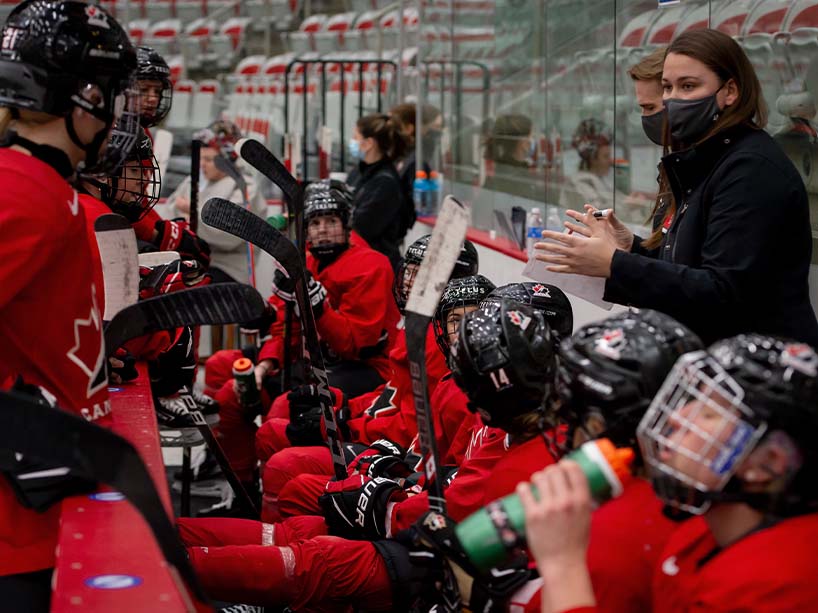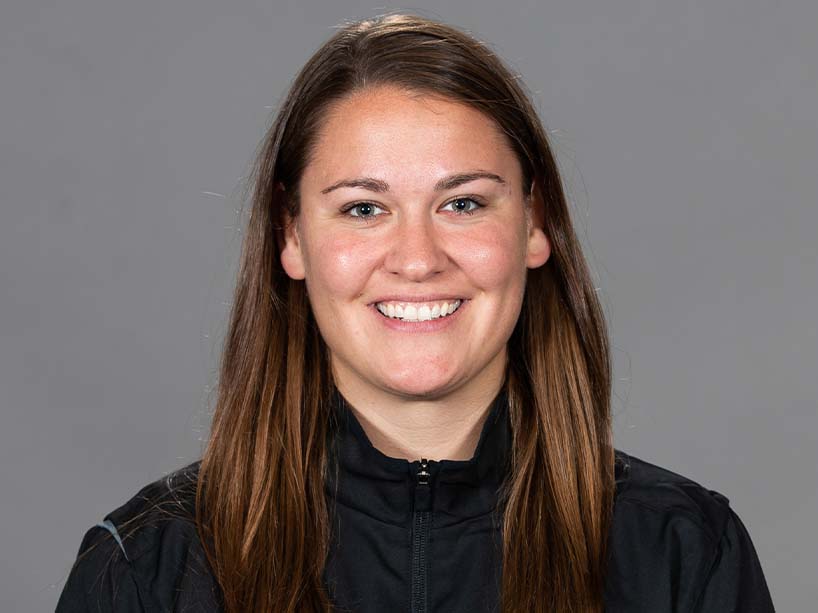One-on-one with Kori Cheverie: the story behind her Olympic hockey gold

Assistant coach Kori Cheverie with members of the Canadian women’s hockey team and 2022 Olympic champions. Photo credit: Matthew Murnaghan/Hockey Canada.
After five years as assistant coach with the Ryerson men’s hockey team - making history as the first female behind the bench in the U SPORTS hockey league - Kori Cheverie recently traded her Rams jersey for a Team Canada one - winning an Olympic gold medal as assistant coach of the Canadian women’s hockey team at the 2022 Beijing Games.
“Everything happened at the right moment,” she said. “We were prepared. Our athletes were in the best shape possible and executed what they needed to. Our coaches executed incredibly, and our staff did an amazing job. I think just everybody pulling in the same direction - it was so nice to be rewarded for all of that hard work.”
Victory for the Canadian contingent came with a 3-2 win over their American rivals - who they had lost to in penalty shoot outs at the 2018 Olympic Games.
“It’s a dream come true,” she said.
Plot twist
Cheverie’s experience winning an Olympic gold medal, however, came about in the least expected way - from her living room in Canada.
Devastatingly, a week before the team was to fly to Beijing, Cheverie tested positive for COVID-19. It meant that she wasn’t able to attend the Games.
“The first night that I found out, I was obviously heartbroken,” she said. “But there becomes a moment where you just put your coach's hat on and say, ‘Okay, this isn't happening. How do I adapt? How do we shift? How do I impact and contribute from afar?” -Kori Cheverie, assistant coach, Canadian women’s hockey team
Since the team had already been using technology to train and communicate throughout the pandemic, supporting the team from home came fairly easily.
“Had we not gone through two years of COVID, of being online and staying engaged and getting creative with technology and doing all of that preparation in isolation, I don't think my being here for it would have been as smooth as it was,” she said.
Throughout the Olympics, Cheverie functioned on Beijing time, watching all of the games - which started at midnight - on TV, noting tips and takeaways as it unfolded, filming herself going through game play, sending it to the team, and going live with the players on video calls in the middle of the night to strategize.
“I was virtual, but it was like I was there,” she said. “It was a different Games experience, but I feel like I lived it, you know?”
Cheverie said watching the game on TV was surprisingly advantageous.
“You get more of a bird's eye view - you see the full scope of everything. Whereas, sometimes when you're on the bench, you're watching for this or that and you're changing the line. Sometimes things get missed.”
Finding a way to connect and support the players was important, she said.
“With some of them, we would meet or connect before and after the games - it became a ritual. It was pretty cool getting to contribute to their game day routine or preparation routine,” she said, adding that when the final whistle blew in the last game and the team began to celebrate, players Facetimed Cheverie from the ice so they could share the moment together.

Kori Cheverie, assistant coach, Team Canada (Matthew Murnaghan/Hockey Canada)
Ryerson experience preps her for Olympics
As for what prepared her to coach at the Olympic level, Cheverie says much of what she learned with Ryerson’s men’s team set her up for success.
While shifting to the men’s game didn’t change the way she coached the players - she says she had to adapt to a different landscape.
Since the men’s game has been in existence for a much longer period of time, she explained, young players have access to more experienced coaches and more opportunities to grow in the game.
“They might be on an OHL team at the age of 16, and their coach might be a former NHL player or a former NHL coach, with 15 to 20 years experience. So when I went on the men's side, I was like, ‘Okay, I have a lot of learning to do,’” she said.
That learning more than paid off.
“A lot of these women have been coached by high quality coaches, too. They know a lot, they study the game just like on the men's side. So, coaching at Ryerson definitely helped prepare me a little more to be at that national level.”
It also made history: Cheverie is the first female coach in the U SPORTS hockey league.
While breaking the barrier is important, she says it wasn’t something she intentionally set out to achieve.
“I didn't think too much of it. I just applied for the job and went through the interview process and was successful,” she said.
“I think the players thought, ‘Okay, this is new’, but then they just got used to it, and everybody else did too… Other people probably made it a big deal, but at Ryerson, we didn't really, because it shouldn't be, right?” -Kori Cheverie, first female coach in the U SPORTS hockey league
Cheverie hopes progress in the men’s game continues, and while she notes that more women are being hired as video coaches, scouts and GM assistants - there has yet to be a female coach in the NHL.
“We need to see somebody on the bench, because visibility matters,” she said.
When asked if that person might be her one day, Cheverie’s face bursts into a grin.
“I’d love to be able to coach in the NHL and potentially hoist the Stanley Cup over my head. Regardless of whether you're a little boy or a little girl, everybody kind of dreams of that,” she said.
As for advice to others looking to break similar barriers, she says, “Character and work ethic are going to take you very, very far. That, and being able to trust yourself, trust your decisions, and to know that you belong there.”
—
Related